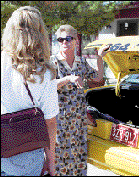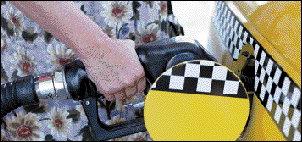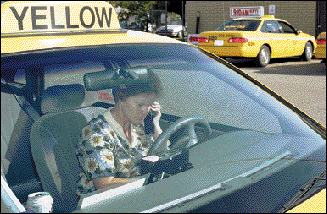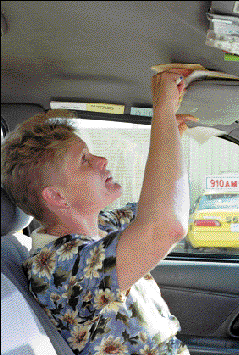photo by E.B. McGovern
Kathy Lynn Mass, 45, is one of a few American women to brave the country's mean streets behind the wheel of a taxi cab. She says her 14-hour days give her the independence she craves.

photo by E.B. McGovern Kathy Lynn Mass, 45, is one of a few American women to brave the country's mean streets behind the wheel of a taxi cab. She says her 14-hour days give her the independence she craves. |
By Brian Anderson
Kathy Lynn Mass was not alarmed when she stopped her car and a clean-cut man who said he was recently released from prison jumped in the back.
But when he casually asked questions about what she would do if someone tried to rob her, she was terrified.
"I've got control of this wheel and I've got control of this car and, if you think you're going to hurt me, we're both going to be two dead puppies," Mass snapped as she hit the gas pedal of her Yellow Cab. In seconds, she was whizzing over the asphalt at 95 mph.
Two miles down the road, he ordered her to pull over and he got out.
"When (passengers) start grilling me about how much I make or how well I did that day, I don't like that," the 45-year-old wife, mother and grandmother said. "It makes me nervous."
Mass is one of a few American women who brave the country's mean streets behind the wheel of a taxi cab. Shuttling people to and from airports, jobs, schools, Laundromats and every place in between has been a way of life for Mass for the past 14 years.
 |
Photo by E.B. McGovern
Mass chats on the phone with fellow taxi drivers between fares. |
It's a career that depends on unpredictable people going to unfamiliar places to do unknown and sometimes illegal things. The job means long hours, isolation and occasionally low pay.
Mass said her 14-hour days give her the independence she craves.
"It's nice to know that after paying the lease, the rest is mine and I don't have to answer to someone else," she said, pointing out that Yellow Cab Co. receives $86.35 of her usual daily take of $100 to $200 for one 24-hour lease. "I'm a pretty independent lady."
As a child in small-town Arkansas, Mass dreamed of working with animals or becoming a long-haul trucker. She didn't quite make it. Decades later, the diminutive woman with cropped blond hair from Blytheville idled in the parking lot of a Tempe strip mall, waiting for a midmorning fare.
"There are a lot of calls, (but) just not around here," she said just as her Vertex two-way radio began to crackle with the sounds of a raspy-voiced dispatcher.
"Rural and the freeway ... Southern and Mill," the disembodied voice blared.
"Eight-six-four," Mass yelled back at him.
"Six?" the dispatcher asked.
"Eight-six-four," she bellowed even louder.
"Eight-six-four," the dispatcher said, confirming Mass' Yellow Cab numbers that sent her to a convenience store for her first fare of the day.
She and her sparkling-clean cab motored to pick up a 30-something Denver businessman who needed a lift to a nearby bank.
It's a short fare, only $5 -- dollar tip included.
"It's only five bucks, but it's a good start," Mass said.
It was a good start with a polite customer, which she said is normal, but years in a taxi have taught her always to remain slightly suspicious.
"I've had a few passengers that scared the heck out of me," she said. "You just never know when you're going to have the wrong nut."
 |
Photo by E.B. McGovern
Mass unloads a suitcase from the trunk of her cab. She shuttles people to and from airports, jobs, schools, Laundromats and every place in between. |
Unlike cabs in some cities, Phoenix taxis do not have protective shields propped in the open space between the front and back seats, said Kathy's husband, Jeff Mass, who trains drivers at Discount Cab in Phoenix.
He added most drivers don't want the shields, given the tar-melting heat of Arizona summers, rarity of robberies and difficulty of chatting with passengers through a Plexiglas wall.
"Some people are a little strange as far as their personalities, but you know they're not thinking about robbing you," Kathy said. "The majority of the people are good."
Carol Underwood, another Valley cabbie, agreed. She said driving a cab is better than hammering the keys of a computer that is stuffed in an office cubicle.
"I don't worry all that much about safety," she said. "Besides, I don't like having a boss."
Independence is the common thread of most female cabbies. Flexible hours and respectable income give a number of wives, girlfriends and mothers a crack at their own identities.
Cabbie Joni Hansen, who works in Des Moines, Iowa, said her role as both mom and dad in a single-parent family excludes her from most traditional careers.
"Driving a cab has been a great way to raise my kids," the mother of three said of her 16-year career. "I've always managed to be at three different little league games at three different places at the same time -- at least for a few minutes."
Hansen said she tools around the greater Des Moines area on a 12-hour shift -- 7 p.m. to 7 a.m. -- "so I can be there for them after school and during the day."
 |
Photo by E.B. McGovern Mass stops to refuel her sparkling clean Yellow Cab. Driving a taxi has been a way of life for Mass for the past 14 years. |
Fears of being robbed or attacked often take a back seat for cabbie moms who give greater priority to paying bills and feeding their families.
For Hansen, Des Moines, with nearly 200,000 residents, has been a safe haven.
"Other than the usual 'Wanna come up to my place, baby?' comments and being pawed on by a few (passengers), I've had no problems," she said, adding that about 10 other women drive cabs in the city.
Mass said some male passengers, especially drunks, assume women drive cabs to cruise for "companionship."
One drunken man she picked up grabbed her repeatedly from the back seat. Despite several warnings and threats of retaliation, he persisted.
"I stopped the car and took him by the ear and pulled him into the street," she said. "I told him 'I think I'm going to call the cops,' but ended up just leaving him on the sidewalk."
Mass said odd-ball riders have become more common and increasingly brazen over the years.
"Passengers' attitudes toward cab drivers are so much different than they used to be," she said. "Before, you could say things or do things to get them to leave you alone. But now they're worse, especially when they've been drinking."
Jeff Mass said he teaches all drivers, especially women, the virtues of fending off undesirable riders.
Anxiety over making the day's lease payment and the excitement of getting a fare can overshadow common sense, Kathy said.
On a slow day about 21/2 years ago, she sat at a crowded cab stand waiting for a call. When four young men called for a taxi at an area restaurant, she responded with lightning speed.
She said that while steering the car into the Mesa restaurant parking lot, a gut feeling of concern and nervousness washed over her.
"I'm not sure what exactly made me worry about these guys," she said. "But I was so excited for the call because it was so dead."
She dismissed the feelings, collected the passengers and set off down the road, making small talk as she does with all of her customers.
While pulling to a stop near the Tempe location where the fares asked to go, they sprung from the car -- sticking Mass with the tab.
"They didn't just skip the fare, they stole my purse," she said. "There were four of them and they were bigger than me. I wasn't going to fight to get my purse back."
 |
E.B. McGovern Kathy finishes paper work in her taxi. After a shift of choking exhaust and despite the reality of working in a dangerous profession, Mass has a sound sense of identity. |
Robberies, fare jumping, murders and other crimes on cabbies terrify Mass' 26-year-old daughter, Gina Hughes, who moved to Arkansas several years ago to be with her father. She said she constantly tells her mother to quit the business.
"The whole thing scares me," she said in a telephone interview from her North Little Rock home. "Besides, she's miserable doing it."
Jeff Mass, 47, said Kathy has developed a keen sense for spotting trouble and does all she can to steer clear of rough parts of the Valley.
"She has enough street smarts," he said. "She knows what she's doing."
Hughes said she fought for independence from the family as a teen-ager and was not often concerned about dangers her mother faced. But now, she said, Mass should consider a new profession.
"I wish she would quit and move to Arkansas.," Hughes said.
Although driving a cab is one of the country's most dangerous jobs, nationwide homicide statistics for the industry are relatively low.
In 1996, about 65 cab drivers, or 1 percent of total occupational deaths, died while working, according to the U.S. Bureau of Labor Statistics. Of those deaths, about 46 were murders.
About 16 cabbies died in car crashes.
In Arizona, the Industrial Commission does not record death or injury rates specific to cabbies.
Mass' 63-year-old mother, Martha Haskins, said she is concerned about her daughter's safety.
"I have an underlying concern for her, especially when a fatality happens to one of the other drivers," she said. "She's careful. She's not a foolish person. I always tell her to be careful, but I've never told her to quit."
Haskins said she worries more about the long hours and low pay that come with shuttling people around the Valley.
"I don't think she gets paid enough," she said. "Sometimes I wonder how she does it."
Mass herself questions whether advantages of driving a cab outweigh the unpleasantness. Ironically, the independence she lauds also entombs her in a sea of solitude.
Long days and nights with her foot on the gas, ear to the radio and eyes in the rearview mirror coupled with an erratic schedule can be frustrating and lonely.
"I don't get to have a lot of friends," she said, laughing. "It's hard for us drivers to socialize because of our different schedules. It's not always fun to eat alone."
With countless hours behind the wheel, coworkers become surrogate family members and acquaintances turn quickly into friends. Caring comrades replace rough images of craggy-faced cabbies. Looking out for each other is a means of survival, Mass said.
"We're just like brothers and sisters," she said.
Still, after the endless shifts of choking exhaust and despite the reality of working in a dangerous profession, Mass has a sound sense of identity and independence.
"I don't take much from anyone," she said. "Don't get in my face. I may be female, but I am mighty."
 |
Photo by E.B. McGovern Organizing small papers wedged in her sun visor occupies Mass in between fares. Ironically, the independence she lauds also entombs her in a sea of solitude. |